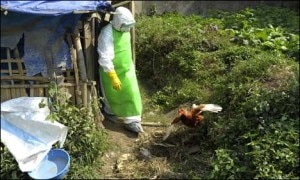Bird flu outbreaks go unabated, govt bans poultry products

KATHMANDU, Nepal-The government on Thursday banned the import, export and distribution of poultry products for a week in Kathmandu Valley with the spread of bird flu outbreak in Bhaktapur and Kathmandu districts.
The government activated clause 15 of the Animal Health and Livestock Services Act-1999 that grant authority to the office in-charge or the Quarantine Officer to curb the movement and transport of animals from the places in Nepal where there is an outbreak of communicable diseases to other places of the country.
Poultry farmers will suffer a loss of an estimated Rs 700 million during the week-long ban. According to the farmers, the valley’s daily chicken requirement stands at 300,000 kg.
The Department of Livestock Services (DoLS) also formed a panel comprising of technical experts and poultry farmers under the chairmanship of deputy director general of the DoLS Ram Krishna Khatiwada to keep poultry farms and sellers under surveillance.
Only on Wednesday, the DoLS had directed the District Livestock Service Offices of Kathmandu, Bhaktapur and Lalitpur to enforce such a ban.
Officials at the Ministry of Agricultural Development said many H5N1-infected chickens were transported out of the capital Kathmandu overnight, spreading the virus to other parts of the country like Pokhara, Bhairawa and Chitwan. They have further warned that the flu might develop into epidemic if the proper measure is not adopted immediately.
Meanwhile, Metropolitan Police Range has speed up surveillance in major check-points of the Capital Kathmandu to control the import, export and distribution of poultry products.
The country witnesses altogether 21 cases of outbreak, 17 of them in Capital Kathmandu during the past two weeks. The government has slaughtered nearly 40,000 chickens and culled 30, 00 eggs besides destroying 28,000 kg of chicken feed during this period.
In the mean time, the government has directed not to adopt ‘parent chicken’ from abroad until the farm owners in Nepal adopted bio-safety measure.

